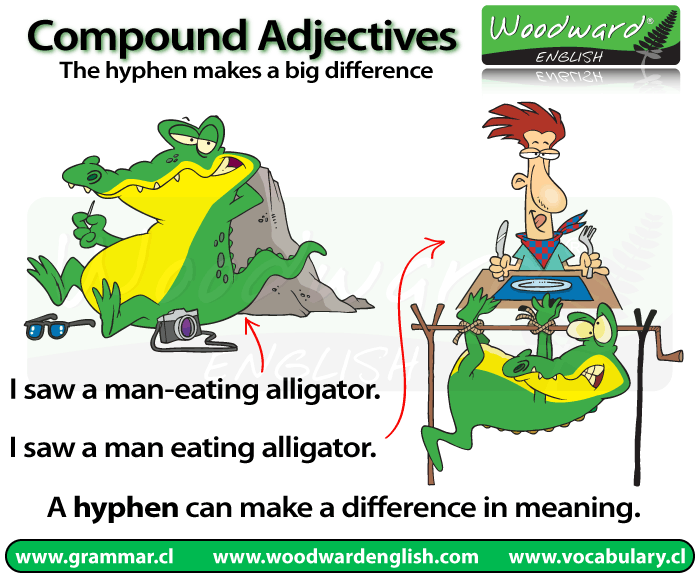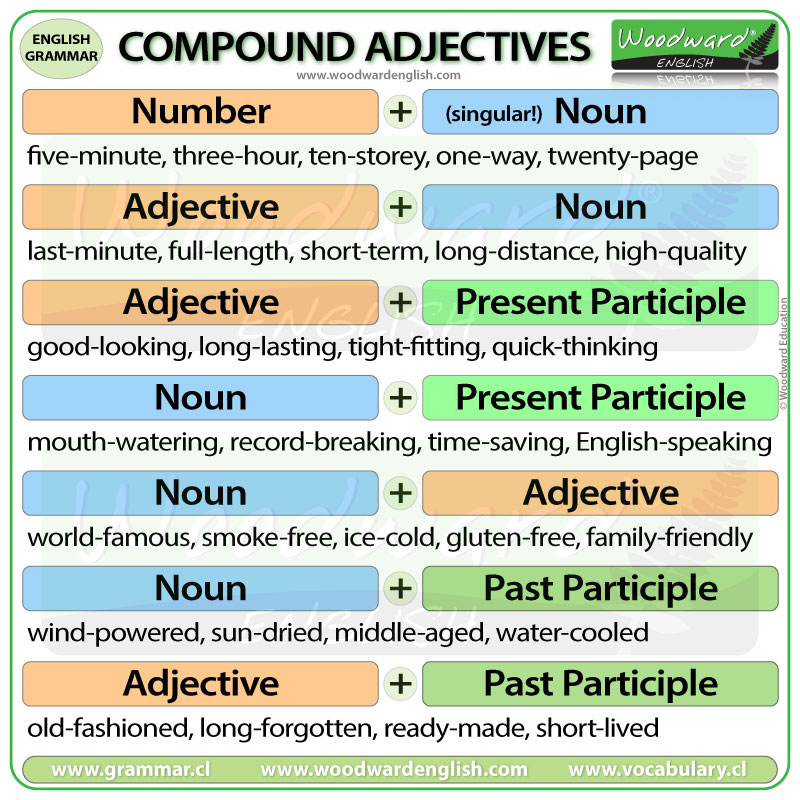Compound Adjectives
English Grammar
A compound adjective is sometimes called a hyphenated adjective. What are they?
Let's look at the following sentences:
- I saw a man-eating alligator.
- I saw a man eating alligator.
The first sentence contains a compound adjective.
The second sentence doesn't.
However the meaning of the two sentences are very different as can be seen in the picture below:

I saw a man-eating alligator.
We are describing the alligator. What type of alligator is it? It is one that eats men (or people).
I saw a man eating alligator.
This sentence without the hyphen sounds like a man is eating an alligator.
(man is the subject, eating is the verb, alligator is the object or thing that is being eaten).
As you can see, the hyphen (or lack of it) makes a big difference in the meaning of the sentence.
Before we explain in more detail why we put that hyphen between those two words in the first sentence, we need to do a quick review of Adjectives.
What is an adjective?
An adjective is a word that describes something.
A red car (red is an adjective because it describes the car. How is the car? Red)
A big book (big is an adjective because it describes the book. How is the book? Big)
See our other grammar notes about Adjectives in English. (LINK coming soon)
But sometimes we use more than one adjective to describe something.
Compound adjectives
A compound adjective is an adjective that contains two or more words.
In general we put a hyphen between two or more words (before a noun) when we want them to act as a single idea (adjective) that describes something.
- I live in an English-speaking country.
English-speaking is an adjective (used to describe the country). We use a hyphen to connect the word English with speaking to show that it is one adjective (or one idea).
This adjective with two words joined by the hyphen is called a compound adjective.
Some more examples of compound adjectives are:
- Our office is in a twenty-storey building.
- I have just finished reading a 300-page book.
- He is a well-known writer.
There are many types of Compound Adjectives. Here is a list of the most common types:

Periods of Time
When we have compound adjectives using a number + a time period, that word referring to a time period is in singular form and is joined to the number with a hyphen.
- I work eight hours every day --> I work an eight-hour day
- I'm going on vacation for three weeks --> I have a three-week vacation
- There was a delay of 5 seconds --> There was a five-second delay
Notice how we normally write the number as a word, not in numerical form.
Adverbs and Compound Adjectives
Adverbs modify a verb.
- She walks slowly.
How does she walk? Slowly. Slowly is an adverb that modifies (or describes) the verb.
Adverbs can also be used to modify an adjective.
- It is very hot today. (Very is an adverb)
- She is extremely intelligent. (Extremely is an adverb)
Notice how we do not put a hyphen between an adverb and an adjective (not even before a noun).
- It is a very hot day.
- She is an extremely intelligent girl.
Noun + Past Participle
When we have a noun + past participle, we put a hyphen between the two words to make it a compound adjective.
- We should start using wind-powered generators to cut costs.
- I love eating sun-dried raisins.
Noun + Present Participle
When we have a noun + present participle, we put a hyphen between the two words to make it a compound adjective.
- I bought some mouth-watering strawberries.
- That was a record-breaking jump.
Noun + Adjective
When we have a noun + adjective, we put a hyphen between the two words to make it a compound adjective.
- She is a world-famous singer.
- This is a smoke-free restaurant.
Adjective + Noun
When we have an adjective + noun, we put a hyphen between the two words to make it a compound adjective.
- It was a last-minute decision.
- We watched the full-length version of the movie.
Adjective + Past Participle
When we have an adjective + past participle, we put a hyphen between the two words to make it a compound adjective.
- That is an old-fashioned dress
- Reptiles are cold-blooded creatures.
Adjective + Present Participle
When we have an adjective + present participle, we put a hyphen between the two words to make it a compound adjective.
- She is a good-looking girl.
- It left a long-lasting taste in my mouth.
Compound Adjectives with Proper Nouns
A proper noun is the name of something or someone (e.g. John, Susan Sanders).
Compound Adjectives made from Proper nouns don't need a hyphen though must have capital letters.
- I bought the James Jackson tickets for us.
James Jackson is a compound adjective describing the tickets (What type of tickets? James Jackson tickets). Since the adjective is a Proper noun, we don't need a hyphen between the two names.
How do we know when to put a hyphen?
If you can use the word “and” between the two adjectives or words, then a hyphen isn't necessary.
- She has a big blue book.
(Big and Blue are adjectives)
Can we say: She has a big and blue book. (Yes, it is possible)
- He is a world famous singer. (Is this correct?)
Can we say: He is a world and famous singer. No, it doesn't sound correct so we need a hyphen to join the words world and famous:
- He is a world-famous singer. (Correct)
Also, look at the following:
- It's an old coal-mining town
Notice how we didn't put a hyphen between the word old and coal. If we had have done that, we would have been referring to old coal, as in coal that is old. We want to emphasise that the town in old and not the coal.
Here we can say it is old and a coal-mining one.
Next activity
See our other lesson about Compound Adjectives, it includes more examples.
See more about Adverbs vs Adjectives
If you found this English Grammar about Compound Adjectives interesting or useful, let others know about it.
